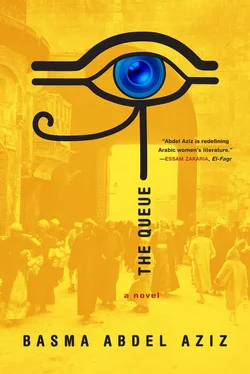Everything ground to a halt. Daily life in the queue couldn’t go on as normal, and it hurt people making a living there, including Um Mabrouk, who was forced to pack up her things and stop boiling water and rinsing out the cups she recycled, out of fear she would be attacked. Like many others, she’d received a threat from the Riffraff — though she wasn’t sure she understood it completely — accusing her of helping to maintain the status quo, and even profiting from it.
Things soon reached a breaking point; there were negotiations and skirmishes, and the man in the galabeya set up prayers for those behind the barriers. People waiting in the queue began to offer compromises to the Riffraff: if the Gate didn’t open within a month, they would sign a cessation of hostilities themselves, or would produce a written contract stipulating that everyone who had been in the queue for more than three months, including time spent away, would leave immediately. But none of these attempts to appease the Riffraff succeeded.
Then one day, they mysteriously withdrew. People simply woke up one morning and realized that the Riffraff were gone. They learned that the people behind the barriers had formed pacts and plans against the Riffraff, together with the microbus drivers, who had sensed impending danger when driving to and from the queue became forbidden. When the Riffraff realized that they would inevitably be driven away, they had rounded themselves up and departed in the night without a word.
The crisis had ended, but it left its mark on everyone in the queue, particularly on those who had received direct threats. It had been a waste of precious time for Um Mabrouk, yet more than that, it had restored her belief that misfortune followed her wherever she went. The drivers returned, supplying the queue with all the news they heard, but it was vague and infrequent. The warring parties had disappeared, but their effects lingered. The ambulance sirens could still be heard, but there were fewer and fewer of them, until finally peace prevailed, and then people learned just how many were injured and how badly.
Ehab stopped by nearly every day and Yehya began to check in with him, asking about the latest information he’d heard, but it wasn’t of any use. The newspaper had no more news than anyone else; nothing — no statistics, no official messages — had been announced at all. The number of microbuses arriving at the corner dwindled, too. When none arrived for a few days, people realized that the gas stations were closed again and that all diesel fuel had been redirected to the arduous cleaning efforts. Scores of bulldozers arrived to clear the debris. They drove past the metal hut on the road to the queue, and some scraped it as they went by. But the soldier inside didn’t reprimand them or even record their number plates. They worked in shifts for days on end, and then at different times at night for weeks, working without pause, lifting rocks and other debris, fallen tree trunks, and even trees still growing in the ground. Sometimes in the dark they picked up people sleeping, by mistake, but the people were always returned the following day, without having suffered significant harm.
A long time passed, and the Events had nearly faded into memory, when one morning the Gate broadcast a public message, declaring that the square was secure again and open to pedestrians. The Disgraceful Events were over, it said, never to return again, and it urged citizens not to be misled by what they had seen, no matter how confident they were in the accuracy of their vision. The broadcast also contained an important announcement: it was shutting down all radiology wards in hospitals, public clinics, and private clinics, confiscating all their equipment and taking it to Zephyr Hospital, which was a subsidiary of the Gate. The Gate had decided to embark on this path of comprehensive reform, the broadcast explained, in the interest of citizens’ physical and psychological well-being. It had conducted follow-ups with patients across the nation, and determined that many of these devices gave false and inaccurate results and printed grainy or misleading images. These devices were being used with no consideration of medical or ethical principles, and any ward or clinic found to be in possession of such would be held accountable and punished accordingly. The message also called for anyone with an X-ray or medical test result of any kind to present it to the Booth immediately, so that it could be inspected and verified, and added that no fees would be collected for this complimentary service.
The announcement was delivered to the newspaper headquarters where Ehab worked, and he immediately called Nagy to tell him. Yehya headed straight for Um Mabrouk in shock, and dialed Tarek’s number again and again. If the message were true, as everyone said, it meant he couldn’t have an X-ray performed anywhere anymore, not even if he called in favors or tried to get one done under the table. When Tarek finally picked up, he didn’t reveal anything on the phone, but he seemed more interested in Yehya than usual. He asked in detail about Yehya’s movements, whether the pain was any less intense, if it was a stabbing pain or a throbbing pain. He asked how often Yehya urinated and what color it was, and he also asked about Amani. But Tarek’s attention was useless to Yehya, who inferred just one thing: the head nurse still hadn’t returned. She must have the X-rays, and Tarek was hiding the reason why she had left.
Um Mabrouk offered to waive the fee for his call and turned down Yehya’s money out of sympathy for his injury. “The world is against you, you want me against you, too? Ya ibni , things are bad enough as it is.” He left her, feeling like his head was about to explode. His memories rushed back to him and then faded away, leaving him in a tangle of conflicting emotions. He was filled with despair and a desire to hide away, but at the same time was infused with a yearning to survive, to start life anew and experience again every moment of sadness and joy and absurdity. He wasn’t in the mood to argue with Um Mabrouk, but he also knew she didn’t pay for the calls she made. Um Mabrouk had won a phone line and endless credit from Violet Telecom, just like so many others had.
Yehya had been on edge as he listened to Tarek’s voice on the other end of the line. As soon as he ended the call he excused himself and left the queue, not heading anywhere in particular. He wandered around, taking in the whole scene from a distance. He knew he needed to see Tarek in private.
He returned a few hours later, cheerfully raising his fingers in a V when he saw Nagy. With a few niceties and a little flirting, he’d won Sabah over and learned that the head nurse had taken a long leave without pay. She’d turned in her notice, gathered her things, and gone to take care of some personal matters, staunchly refusing to discuss this sudden decision with anyone in the hospital. She’d been extremely secretive, concealing her decision until the day she left, and no one had been able to find out what had come over her, despite numerous attempts by her close friends and colleagues. Sabah also told him that she’d uncovered part of the secret herself. She’d learned that the hospital was considering hiring a new head nurse while the director thoroughly investigated the situation, which was this: a week ago, or perhaps more, the head nurse had joined the queue for the Gate.
Things soon returned to normal in the queue, and daily life picked up where it had left off. It was a charge led by Um Mabrouk, who got rid of her old cheap cups and bought nicer glass ones in celebration of the Riffraff’s departure. She wiped her palms and the backs of her hands on her dress, and handed the man in the galabeya a cup of anise tea with two tea bags instead of just one, adding, “Lord grant you good health.” He muttered a few words as he took the first sip, oblivious to her smile, but she persisted. “Don’t you have a prayer, or something to say for heath and better days ahead, ya Hag ?” she asked. He didn’t indicate whether he had heard her, or if he had, whether he would respond, and didn’t lift his gaze from the cup. Her smile faltered and she backed off, embarrassed, saying, “Ah, maybe you didn’t hear me … don’t worry, take your time.” He finished the last drop of anise tea, quickly glanced at her from the corner of his eye, and wiped his beard, staring at the simple setup around her. He took out his prayer beads and advised her, while thumbing one golden bead after another, to come to the lessons he gave at the front of the queue. Many of the righteous attended these weekly lessons, and some even came from beyond the queue. “Early next week,” he said. “It would do you good to come, by the will of God Almighty.”
Читать дальше











